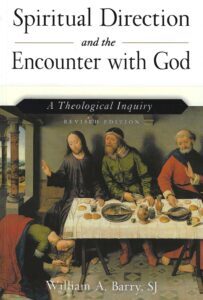Barry Engages Faith

William A. Barry. 2004. Spiritual Direction and the Encounter with God: A Theological Inquiry. New York: Paulist Press.
Review by Stephen W. Hiemstra
During my seminary years I participated in the Pierce Fellowship at Gordon-Conwell Theological Seminary at the urging of the director, who was a personal friend. The Pierce Fellowship encouraged students to focus on discipling and evangelism and became my home away from home during those years, Attending to the spiritual life was natural for Pierce fellows and it led to my writing focus after seminary.
Introduction
William Barry in his book, Spiritual Direction and the Encounter with God, defines spiritual direction:
“as help given by one Christian to another which enables that person to pay attention to God’s personal communication to him or her, to respond to this personally communicating God, to grow in intimacy with this God, and to live out the consequences of the relationship.” (2)
Spiritual direction focuses on discerning the work of God in a person’s life and helping them to focus on it. This focus differs from offering counseling and relies primarily on the director’s ability to discern the spirit of God and distinguish it from the wiles of Satan (Eph 6:11). As such, spiritual direction is most popular in the contemplative school of thought.
Background and Organization
William Barry is an ordained Roman Catholic (Jesuit) priest who studied in Germany and Weston College, earning his doctorate at the University of Michigan.
Barry writes his book in eight chapters:
Introduction
Understanding God’s Presence in the World
The Religious Dimension of Experience
A Theology of Trinity and of Community
The Development of the Relationship with God
A Theology of Discernment of Spirits
A Theology of the Ministry of Spiritual Direction
Conclusion (v)
These chapters are preceded by two prefaces and followed with annotated references. Three of the thirteen references are his own books. Conspicuously missing is John Macmurray’s book, The Form of the Personal, which he quotes frequently in the text. Many of his other references appear only in the chapter notes.
Events and Actions
The influence of Macmurray on Barry is foundational. Macmurray writes:
“Every event has a cause, every action has a reason or intention. Events are attributed to non-agents; acts to agents.” (9)
Barry uses this distinction to posit that God is involved in his creation. This focus of Barry’s work is interesting because all actions need to interpreted; otherwise, they devolve into mere events.
Because there are potentially an infinite number of interpretations, our actions and God’s can and should overlap. Barry writes: “God is an ingredient in every human experience” (25) yet not in a deterministic way that would limit human freedom. He goes on to say: ”Just as I am not my action, but transcend it in some real way, so too and a fortiori, God is not his action, but transcends it.” (32)
This observation is important because we cannot infer God’s actions without belief. Barry notes: “The direct encounter with God is always mediated.” (37) Thus, the role of a spiritual director rests on assisting with this mediation.
The Affective Principle
Barry sees the experience of God’s love as foundation to any journey of faith (61). After that point, the next step in faith is to experience themselves as sinners (63). The pervasiveness of sin in the world can, in fact, be so overwhelming as to be an impediment to progress in faith (65).
This affective principle seems like an application of Abraham Maslow’s Hierarchy of Needs where our needs are leveraged from physiological needs, safety, love and belonging, to self-esteem and self-actualization (Sachs, 2012, 130). Many of the New Testament healing stories of Jesus, like the healing of the blind man in John 9, appear to work this way. The mercy of God that we feel because Jesus died on the cross for our forgiveness is frequently described as the love of Christ. In other words, meeting a basic need helps us in developing faith that more advanced needs will also be met.
The Clumsy Dance Partner
Many people believe that God’s will for their lives is a kind of puppet manipulation. Barry writes:
“God’s will for each of us is not utilitarian; that is, God does not use us for God’s own purposes. We are not means to God’s end.“ (80)
Our interaction with God Barry likens to having a clumsy dance partner that holds on too tightly. A really good dance partner simply anticipates our movements and requires only the lightest touch (79).
Assessment
William A. Barry’s Spiritual Direction and the Encounter with God is an interesting and informative guide to the practice of spiritual direction or, perhaps more nearly, spiritual friendship. The audience for this book includes committed Christians, seminary students, and pastors who are willing to struggle a bit with their faith and the deepening of it.
References
Sachs, Jonah. 2012. Winning the Story Wars: Why Those Who Tell—and live—the Best Stories Will Rule the World. Boston: Harvard Business Review Press.
Footnotes
https://www.ignatianspirituality.com/....
Barry Engages Faith
Also see:
Crucial Conversations Target Productive Dialog
Warren Writes to Grow Characters
Books, Films, and Ministry
Nouwen: Make Space for Self, Others, and God
Vanhoozer: How Do We Understand the Bible? Part 1
The Face of God in the Parables
The Who Question
Preface to a Life in Tension
Other ways to engage online:
Author site: http://www.StephenWHiemstra.net
Publisher site: http://www.T2Pneuma.com
Newsletter at: https://bit.ly/Sum_May_2024 , Signup
The post Barry Engages Faith appeared first on T2Pneuma.net.



